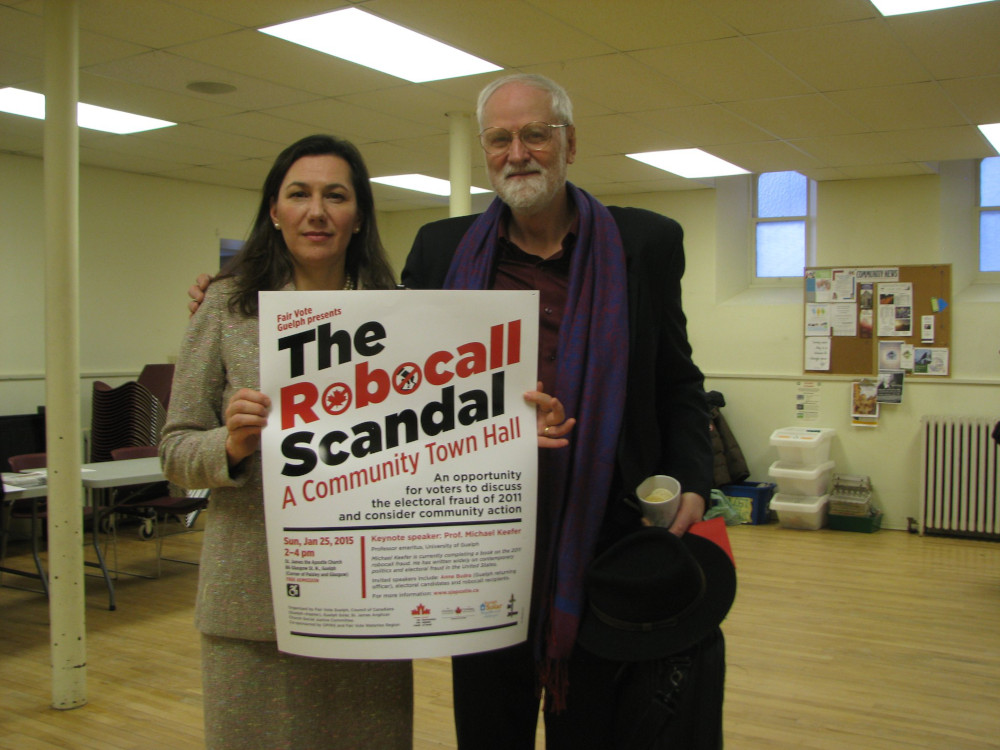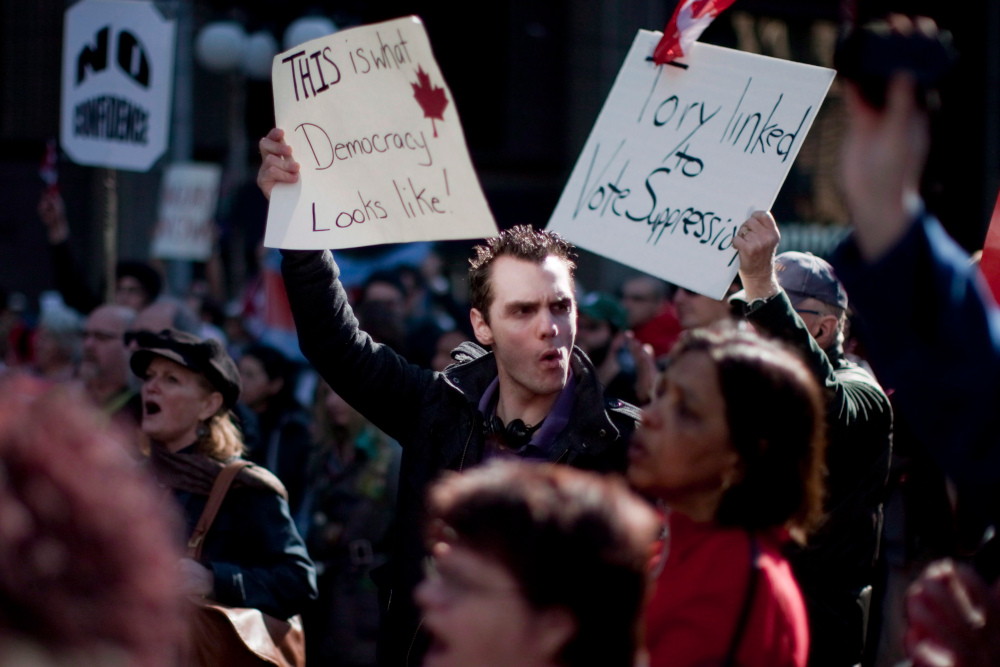“If the 2008 voter fraud in Saanich-Gulf Islands had been investigated properly, there might not have been the 2011 robocalls nationally. It was a dry run.” Green Party Leader, Elizabeth May
Who stole the vote in Saanich-Gulf Islands for the Conservatives in the 2008 federal election?
Who tried to steal the vote in hundreds of ridings across Canada, including in Guelph, Ontario, in 2011, using data from the Conservative Party’s Constituency Information Management System (CIMS)?
It remains the ultimate Canadian whodunnit. It was attempted grand larceny electoral style, but no one knows, or perhaps wants to know, who the culprits were.
On Oct. 14, 2008, the day after robocalls from a dirty trickster bamboozled voters in Saanich-Gulf Islands, The Tyee exposed the con. In 2011, Elizabeth May worried they’d happen again — and sure enough, they did, this time on a national scale.
To this day, the perps are walking free and perhaps, like successful perps everywhere, preparing to strike again.
“It’s a cold case, but it is still an unsolved crime,” Green Party Leader Elizabeth May told the Tyee recently.
“I like getting to the bottom of things. I’ve tried everything to get the Commissioner of Elections and the RCMP to re-open the robocalls investigation, but they won’t. We’re not getting to the bottom of things anymore. So, guess what? They will happen again.”
The Commissioner of Canada Elections and the Trudeau government should think long and hard before consigning May’s request to the slag heap of history. Like a boomerang, the issue is on its way back.
For one thing, Canada is in an election cycle again, as it was in 2008 and 2011, when robocalls first tainted the electoral process.
Judging from the most recent report of the Communications Security Establishment, the national hush-hush boys think the integrity of our electoral system is at risk from hackers again in 2019 — and that includes federal candidates, parties, and voters.
In fact, CSE thinks that past successes, like Russian hacking into the Democratic National Committee computers in the 2016 presidential elections in the U.S., make future attacks in Canada “very likely.”
Despite that warning in bureaucratic Day-Glo, no one has bothered to transpose the logic to Canada’s domestic experience with data crimes at election time. No one has bothered to connect the dots to conclude that the same actors who pulled off election fraud here without getting caught will soon be back at it again. We don’t have to wait for it to happen; it has already occurred in two elections.
There is a lot of misconception surrounding data crimes from the robocalls era. The biggest one is that it is yesterday’s news. In fact, it is tomorrow’s bombshell story waiting to be uncovered. Enough citizens know that to be pressuring Ottawa to re-open the investigation.
Guelph resident Susan Watson has just forwarded a well-documented request to the House of Commons Standing Committee on Procedure and House Affairs, asking the committee to reopen the robocalls investigation. Amongst its many duties, PROC is charged with looking into electoral matters.
After hitting a dead end with committee chairman and Liberal Yukon MP Larry Bagnell, Watson has doggedly buttonholed various committee members asking them to raise the issue. She is a citizen on a mission. (The PROC chairman did not respond to The Tyee’s written request for a comment.)
“If we are truly going to protect our democracy from hacking and malign actors going into the 2019 federal election, we need to get to the bottom of how the Conservative Party database was breached, and by whom,” Watson wrote.

Her point is inarguable.
In the wake of the Guelph robocall scandal, in which hundreds of voters were misdirected to the wrong polling stations by fraudulent phone calls purportedly from Elections Canada, the case suddenly got a whole lot bigger.
The Council of Canadians brought a key lawsuit that showed for all to see that the robocalls were something of a Batman plot, a national campaign run by a network of sophisticated schemers that flew under the radar.
Presiding Judge Richard Mosley found the robocall voter fraud to be “widespread” and part of a “concerted campaign” by people with access to the CPC database. That database was controlled by the party. Mosley’s finding put an end to the ludicrous idea that the robocalls were the work of the lone person who went to jail for this data-crime, then 22-year-old Conservative staffer Michael Sona.
Remember, evidence produced at Sona’s trial showed that he never once accessed the CIMS database, though he had the authority to do so when it came to downloading constituent lists from his candidate’s riding. That list contained the names of party non-supporters, who ended up getting the vote-suppressing robocalls.
That fact adds an interesting dimension to Judge Mosley’s findings. Since there were established breaches of CIMS not just in Guelph, but also in Winnipeg South Centre, Yukon, Saskatoon-Rosetown-Biggar, Elmwood-Transcona, Nipissing-Timiskaming, and Vancouver Island North, Sona could not have been the culprit.
Why?
He had no authority to access CIMS for the constituent lists in ridings other than the one he was working in. A much bigger fish was involved here.
Another misconception about robocalls is that it is somehow not a crime, or even a serious matter.
Nothing could be further from the truth at a time when voters are furtively cyber-stalked without their knowledge, and carefully targeted. The days of the partisan brochure-drop at the front door by a grinning candidate are over. When the data thieves single you out, you never see them coming.
This scam was in fact a carefully contrived illegal scheme to alter the results of an election by way of deception. It was nothing less than the “weaponization” of information against citizens who didn’t know they were even in the CIMS database. Tellingly, no citizen of Canada has the legal ability to this day to find out what information any political party holds on them.
Some people might say that the Commissioner of Canada Elections has already investigated and closed the robocalls case. That is true.
But the investigation into robocalls bore no resemblance to the vigorous, even heroic inquiry conducted in the wake of the so-called In-and-Out scandal. In that scandal in 2006, the Conservatives exceeded spending limits by $1 million. And investigators nailed them.
By comparison, the robocalls investigation was a wimpy affair, relying largely on evidence supplied by the very people being investigated, the Conservative Party of Canada.
Investigators never gained access to the CIMS system and allowed then CPC lawyer Arthur Hamilton to sit in on Elections Canada interviews with Conservative party supplied witnesses, even though he was not representing them.
According to the interview transcripts, Hamilton even advised witnesses about how much detail they could provide, as reported by the National Post on Sept. 11, 2013.
Remarkably, the commissioner didn’t even open the books on its investigation of robocalls in Saanich-Gulf Islands after Senator Mike Duffy’s sensational testimony under oath at his Ottawa trial on Dec. 10, 2015. Or should I say, “show trial.”
Duffy, found innocent of all 31 charges he faced, and a victim of a PMO hatchet job, claimed that local voters in Saanich-Gulf Islands were advised to vote NDP at the behest of Conservative operatives, even though the NDP candidate had dropped out of the race. Duffy testified that it was only because of “the divine intervention of Doug Finley’s black-ops group at Conservative headquarters that he [Gary Lunn] managed to get himself re-elected.”
Finley was the CPC campaign chairman in the 2006 and 2008 federal elections. In 2009, Stephen Harper appointed him to the Senate, even though he was under investigation for violating campaign-spending limits.
The charges were later dropped in return for the CPC pleading guilty to breaching spending limits in the 2006 election by $1 million. In the end, they paid a $230,000 fine. Do the math. Not a bad deal for the cheaters.
To be fair to Elections Canada investigators, they did not have the basic tools under their legislation to do a proper investigation of robocalls. The key tool they lacked was the power to compel evidence.
That was a fatal flaw. At least one key witness refused to be interviewed. And a number of unnamed people and “entities” were slow to respond to and unwilling to assist the investigation. As a result, it is still not known if anyone at CPC headquarters knew about robocalls — or that single, unexplained phone call that went out from the CPC war-room the day before the election to RackNine. RackNine was the company that placed the false phone calls that misled Guelph voters.
Former prime minister Harper, who said the robocalls scandal was just sour grapes from political parties bitter over losing the election, responded to it with the hilariously christened Fair Elections Act. Elections Canada was dissected like a garden worm with one thrust of the legislative spade. Divested of its hot air, the new legislation fronted by Harper sock-puppet Pierre Poilievre made it harder to vote and easier to cheat.
But now, thanks to the Liberals and Bill C-76, Elections Canada has regained its institutional unity. The Commissioner of Canada Elections has been relocated within the Office of the Chief Electoral Officer. Harper had separated them, effectively reducing collaboration between the two offices on investigative matters.
Just as important, the reunified office now has a very powerful tool unavailable to it at the time of its original investigation of robocalls — the right to go to a judge and get the authority to compel evidence from a reluctant witness.
Some say too much time has passed to apply these new powers to robocalls. That is nonsense. Serious cold case crimes always need to be solved. So what are federal authorities and members of the government waiting for?
Here are some of the questions a new investigation needs to answer, if need be by taking advantage of the expertise of CSIS and the CSE.
Who made those calls that appeared to come from the United States, in both the Saanich Gulf-Islands Robocalls effort, and the Guelph Robocalls case?
Why has the Conservative Party of Canada been so lackadaisical about the “shocking and widespread” breach of their database, if in fact it was hacked and misused by others? The normal reaction when you have been robbed is to scream blue murder. The CPC didn’t even report this breach to the dogcatcher.
The CPC has said it had nothing to do with robocalls, a claim that rings hollow since its own database supplied the list of non-supporters who got calls. Has anyone ever asked the Tories if they dealt with any third parties who might have committed these crimes?
Why was the impersonation of a Liberal in a known but unsent robocall message in the Guelph election not investigated as a crime? True, it is not Election Canada’s mandate to enforce the Criminal Code, but the matter could have been referred to the RCMP. This was potential impersonation.
How did the number for Pierre Poutine’s infamous burner phone, which was used in the Guelph robocall caper, apparently show up in another federal riding, Windsor-Tecumseh?
At the very least, Commissioner Yves Cote’s 2014 decision to close the investigative books on robocalls needs to be revisited. Never mind his reservations about going before a judge so many years after these crimes were committed. Not only is there new evidence to support that effort, not only is it vital to the protection of democracy and privacy rights, the problem isn’t going away.
Just two years after the 2011 robocalls scandal, the CPC funded another fake information campaign in Saskatchewan.
This time it was called an interactive public opinion survey, or “push-poll.” That is an American disinformation campaign tactic where an automated caller asks a loaded question. By pressing a button on their phone, the unsuspecting target of the call answers. A poll result is then presented as a true measure of public opinion after the skewed question has been asked and answered.
In the Saskatchewan case, the recording told people who picked up their phones that if five new urban seats were created by changes to the province’s electoral boundaries, “Saskatchewan values” would be undermined. That was bullshit in running shoes.
The law requires that the entity placing these calls identify itself. In Saskatchewan, the automated voice said he was calling from Chase Research. But guess what? Chase Research didn’t exist.
And that isn’t all. An expert in forensic voice analysis engaged by reporters from Postmedia concluded that there was a 95 per cent likelihood that the voice on the Saskatchewan robocall message belonged to Matt Meier. It was Meier’s company, RackNine, which was responsible for the robocalls in the 2011 election that misled voters in Guelph.
The final irony? Although the CPC originally denied it, the Saskatchewan robocalls were paid for by none other than the Conservative party itself.
The Alberta Party is now asking the province’s election commissioner to investigate a robocall in which someone apparently “impersonated” Alberta Party Leader Stephen Mandel just 48 hours before the 2019 provincial election. This “fake” Mandel said that he supported United Conservative Party leader Jason Kenney.
There is one more thing about robocalls that Justin Trudeau & company, and the Commissioner of Canada Elections should keep in mind. A full-length documentary film is scheduled for formal release in 2019 from gifted Ottawa filmmaker Peter Smoczynski. It is called Election Day in Canada: When Voter Suppression Came Calling, or E-Day.
The film is like a punch in the conscience.
The list of those interviewed is impressive, including former NDP leader Thomas Mulcair, Green Party Leader Elizabeth May, former Liberal party justice minister Irwin Cotler, former chief electoral officer Jean-Pierre Kingsley, ex-Conservatives Inky Mark and Brent Rathgeber, Stephen Maher and Glen McGregor, the journalists who broke the story. It even features the one guy who nearly committed suicide in his bathtub before ending up in the slammer over robocalls, Michael Sona.
Canadians like politicians who fix problems, not elections. There is no statute of limitations on institutional corruption.
Time to belly up to the bar and bust the dudes who tried to steal democracy.
The Tyee’s federal election coverage is made possible by readers who pitched in to our election reporting fund. Read more about how The Tyee developed our reader-powered election reporting plan and see all of our stories here. ![]()
Read more: Election 2019, Rights + Justice, Federal Politics, Elections

















Tyee Commenting Guidelines
Comments that violate guidelines risk being deleted, and violations may result in a temporary or permanent user ban. Maintain the spirit of good conversation to stay in the discussion.
*Please note The Tyee is not a forum for spreading misinformation about COVID-19, denying its existence or minimizing its risk to public health.
Do:
Do not: